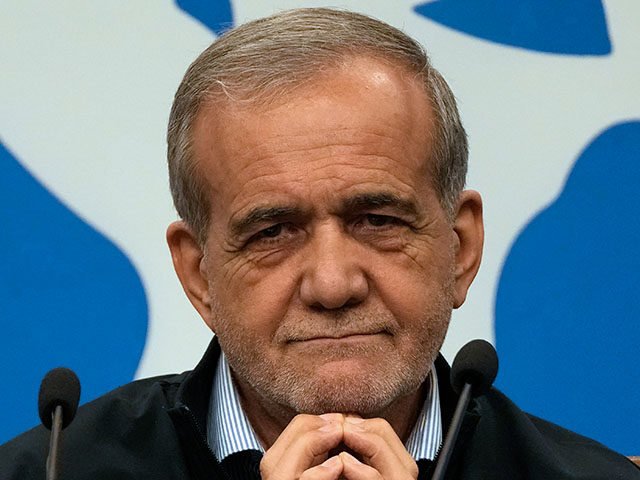Iran’s self-proclaimed “moderate” President Masoud Pezeshkian is expected to visit New York next week for the United Nations General Assembly.
The president’s office confirmed on Tuesday that Pezeshkian will be traveling to New York on Sunday to attend the General Assembly’s general debate, a platform in which the heads of government of all member nations, or a designated representative, is allotted time to address the world on any topic of their choosing. The general debate often derails as world leaders flagrantly disregard the “voluntary” 15-minute speaking time limit and use their time to address local or regional grievances of little significance to much of the audience.
Pezeshkian will speak before the General Assembly as well as “hold meetings with Iranian expatriates residing in the US, leaders of religions, media managers, and members of American think tanks,” according to the Iranian Tasnim News Agency.
In the days preceding the visit, the president has hinted to softening his tyrannical regime’s stance on human rights abuses against women, its illicit nuclear development, and other hot-button issues – potentially to foment goodwill prior to his debut on the world stage.
A barrage of conciliatory language out of Tehran emerged on Monday, beginning with the Foreign Ministry suggesting it is open to reviving the 2015 Joint Comprehensive Plan of Action (JCPOA), the failed nuclear agreement established under U.S. President Barack Obama. Successor Donald Trump withdrew from the JCPOA in 2018 on the grounds that Iran had consistently violated it, but the agreement still exists in theory between Iran and the other guarantor states: the U.K., China, France, Germany, and Russia. The head of the International Atomic Energy Agency (IAEA), Rafael Grossi, lamented in June, however, that the JCPOA “exists only on paper and means nothing … Nobody applies it, nobody follows it.”
Grossi more recently confirmed that Iran stopped following any of the provisions of the JCPOA after Trump left the presidency to successor Joe Biden.
“In my opinion, the JCPOA is still a suitable framework that will lead us to a new agreement,” Iranian Foreign Minister Abbas Araghchi told reporters on Monday, suggesting that rehabilitating the deal without American participation was possible.
“A proper foundation must be created for restarting the negotiations and then we enter into negotiations that proceed based on the same formula used in the JCPOA,” he added, “which was confidence building instead of lifting sanctions.”
“The JCPOA was based on the logic that Iran would build confidence in its peaceful nuclear program and the other side would lift sanctions. We can return to this formula,” he asserted, according to Tasnim.
Araghchi dismissed any imminent negotiations with the United States because of the November presidential election.
“It is a fact that the Americans are not ready to negotiate now,” the foreign minister asserted, calling the situation “completely normal”: “No country is ready for serious negotiations at the time of elections.”
Following Trump’s withdrawal from the agreement, Biden attempted to reintroduce America to the JCPOA through negotiations in 2021. These failed catastrophically, as Biden sent an envoy to talks in Austria, Robert Malley, but Malley stayed at a different hotel than where the talks were occurring and only managed to loiter outside with no invitation or impact on the negotiations. Malley later disappeared from public view in June 2023, reportedly suspected of mishandling classified materials.
In addition to apparent interest in a return to nuclear talks – now that Iran is reportedly in possession of an enriched uranium stockpile 30 times the size the 2015 deal allows – Pezeshkian himself addressed the ongoing torment of Iranian women under his radical Islamist regime on Monday, claiming he would tell the notorious “morality police” to stop harassing women. Iran has experienced an unceasing wave of civil unrest that escalated in 2022 following the brutal killing of Mahsa Amini, a 22-year-old women who “morality police” beat to death of allegedly wearing her hijab incorrectly. Under Pezeshkian’s predecessor Ebrahim Raisi – a notorious human rights criminal who died in a mysterious helicopter crash in May – Iranian police killed and otherwise brutalized protesters demanding basic respect for the human rights of women.
Pezeshkian suggested that, with permission of “supreme leader” Ayatollah Ali Khamenei, Tehran would order the “morality police” to stand down.
“The morality police were not supposed to confront [women]. I will follow up so they don’t bother [them],” the BBC quoted the president as saying.
Pezeshkian won the special election to replace Raisi as somewhat of a surprise candidate, as he had hinted to having some sympathy for the Mahsa Amini protest movement and to those suffering economic hardships under the Islamist regime.
“We are losing our backing in the society, because of our behavior, high prices, our treatment of girls and because we censor the internet. People are discontent with us because of our behavior,” Pezeshkian said before being elected.
He has since vowed allegiance to the “supreme leader”‘s agenda, including virulent opposition to the existence of Israel and antagonism against the United States.
Given his status as an underling to Khamenei, it is unclear if Pezeshkian has the authority to limit morality police abuses. Yet stating that he would act in public grants him a talking point with which to enter the General Assembly on a positive note after being expelled from the Women’s Rights Commission after the Mahsa Amini killing in 2022.

COMMENTS
Please let us know if you're having issues with commenting.